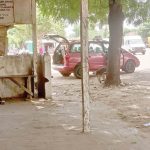The rising cost of living in the country assumed another dimension on Thursday with an attack on a truck carrying food items in Suleja area of Niger State.
This is just as hundreds of residents of Dikwa town in Borno State protested and raised serious concern over hunger, threatening to join terrorists in the state.
The developments come amid the nationwide hardship that has triggered protests in different parts of the country.
Early this month, there was a protest in Minna, the capital of Niger State, in which a group of women blocked the Minna-Bida Road at the popular Kpakungu roundabout to express their grievances over the rising cost of food items, which has made access to three square meals per day to become increasingly unattainable for millions of people.
Dollar crisis: FG urged to harness foreign remittances, informal markets
ECOWAS may lift sanctions on Niger, Mali, Burkina Faso
In what look like another turn of events, soldiers had to open fire yesterday when some youths attack trucks loaded with foodstuff in the Suleja area of Niger State.
Alhassan Abdullahi, a witness, told our correspondent that many trucks from Abuja and heading for Kaduna were blocked by the hoodlums, who burnt tyres on the road.
He said many bags of assorted foodstuffs, especially rice, were stolen before soldiers arrived at the scene.
“It took the intervention of soldiers who arrived at the scene and started firing gunshots in the air to scare the hoodlums away. But even at that, many of them went away with bags of rice and cartons of spaghetti and other food items.
“We learnt commercial motorcycle riders are also planning a protest. They would have done it since yesterday but we didn’t know what stopped them,” he said.
Police stop protest against hunger in Jigawa
Meanwhile, police operatives yesterday blocked protesters from staging a peaceful demonstration against hunger, social and economic difficulties in Jigawa State.
The protest was organised by civil society organisations and political associations.
Dozens of riot police operatives were stationed at various locations around Dutse, the state capital, to block the protesters from marching on the streets.
According to the spokesperson of the state police command, DSP Shisu Lawal Adam, the protesters did not obtain permit.
He said the police saw the announcement of the protest on social media, adding that there could be total breakdown of law, order and public peace if allowed to hold.
He said the police had obtained intelligence that some miscreants had planned to hijack the demonstration to unleash mayhem.
When contacted, Chairman of SAWABA Initiative for Humanitarian Development and one of the organisers, Comrade Bashir Alkasim said less than 10 hours to the commencement of the protest, the police invited them for “a discussion”.
He explained that the state police commissioner requested them to postpone the demonstration due to some security issues, saying they were prevailed upon to withdraw the plan.
Comrade Alkasim said they wanted to hold the peaceful demonstration to draw the attention of federal, state and local governments to the current hunger, social and economic difficulties in the country, adding that it was also to stress the need for the authorities to do the needful to rescue the situation, which kept degenerating day by day.
“Since the removal of fuel subsidy, the government claimed to have got more money and shared it with other tiers of government, but what only reflected in the lives of civil servants and the common man on the street were increased hardship, poverty, hunger and other social and economic difficulties.
“We are calling on President Bola Tinubu to review his economic policy to align it with the needs and the welfare of Nigerians than foreign interests. We want local government financial autonomy to be revisited and granted fully,” he said.
“In Jigawa, we are calling on the state governor, Malam Umar Namadi to increase the workers’ wage award from the proposed N10,000 to N30,000, which should be paid before Ramadan.”
Dikwa residents march on streets
Also, yesterday, hundreds of residents of Dikwa town in Borno State have protested and raised serious concern over hunger and their inability to feed their families, given the recent nationwide hike in prices of commodities.
Daily Trust correspondent had obtained some videos showing hundreds of women and children lamenting on the streets, saying “Hunger and thirst are killing us.”
According to an eyewitness, they described their problems as double tragedies due to lack of access to farmlands and severe shortages of foodstuff.
A top government source said Dikwa town is suffering from severe food shortages as a result of the collapse of livelihoods since the Boko Haram crisis paralysed economic activities in the ancient town.
“It is sad that things have gotten to this level; the women are threatening to join the insurgents due to lack of food to feed their families. You can agree with me that our governor, Professor Babagana Zulum has been trying his best, distributing food and non-food items to cushion the effects of the hardship; but the situation is overwhelming.
“President Tinubu should urgently intervene; this is beyond what the state government can handle. We need special intervention as soon as possible to cushion the effects of hardships that our people are going through presently,” he said.
Another resident expressed fear that the current situation might jeopardise the peace restored over the past years.
“As you’ve seen in the video in the morning, the residents threatened to collaborate with, as well as move to Boko Haram camps, as they said they cannot withstand the severe hunger anymore.
“The government must understand what is going on, and take immediate action to avert this looming catastrophe from happening,” he said.
The insurgents in the adjoining bushes were said to be luring the residents with incentives to cross over to their side as a way to address their food problems.
NEC outlines initiative to ensure food security, affordability
The National Economic Council (NEC) has taken steps to put an end to the economic challenges confronting the nation, including making fertilisers available to farmers and the establishment of agro-rangers to tackle insecurity in the farms.
The decision was reached yesterday during the 139th meeting of the Council held virtually and chaired by Vice President Kashim Shettima.
The vice president said that with collective efforts in developing a clear and actionable roadmap through short, medium, and long-term strategies, Nigeria will overcome its economic challenges.
Following a presentation by the Minister of Agriculture and Food Security, Abubakar Kyari, on food security, Vice President Shettima directed a meeting of the federal government with major fertiliser producers in the country, including Indorama, Dangote and Notore.
NEC noted that fertiliser is a major ingredient of agricultural productivity which the government is striving to attain, and urged the state governors to embrace modern agricultural practices to increase food productivity.
The vice president also lamented that Nigeria had been a victim of strong averseness to evolving and keeping up with the changing global economic order, leading to a situation where making difficult decisions to maximize its potential has become inevitable.
Delivering his opening speech titled, “It’s Time to Speed Up Our Prosperity Quest,” Shettima told council members that it is President Tinubu’s desire that they all stand together to collectively proffer solutions to safeguard the nation’s economy from imminent implosion.
Noting that the citizens are only keen about tangible results, the VP stated that while economic experts foresaw this transitional phase on our journey to a flourishing future, it is crucial to recognise that the ordinary citizen on the street is not concerned with any economic theory. Their daily concerns are anchored in the tangible.
“They are more invested in the price of maize than the predictions of GDP. So, as we deliberate on intricate economic strategies today, let us remain attuned to the heartbeat of the nation. We must ensure that our decisions resonate with the aspirations of the common man and woman who entrust us with their hopes and dreams”, he stressed.
Acknowledging that the country is in the midst of a pervasive emergency, VP Shettima implored state governors, ministers and other NEC members to align their minds and actions with the reality on ground.
In his presentation, the minister of agriculture also called for action against dollarization of locally produced commodities like urea, which is impacting negatively on fertiliser prices and agricultural productivity.

 Join Daily Trust WhatsApp Community For Quick Access To News and Happenings Around You.
Join Daily Trust WhatsApp Community For Quick Access To News and Happenings Around You.


